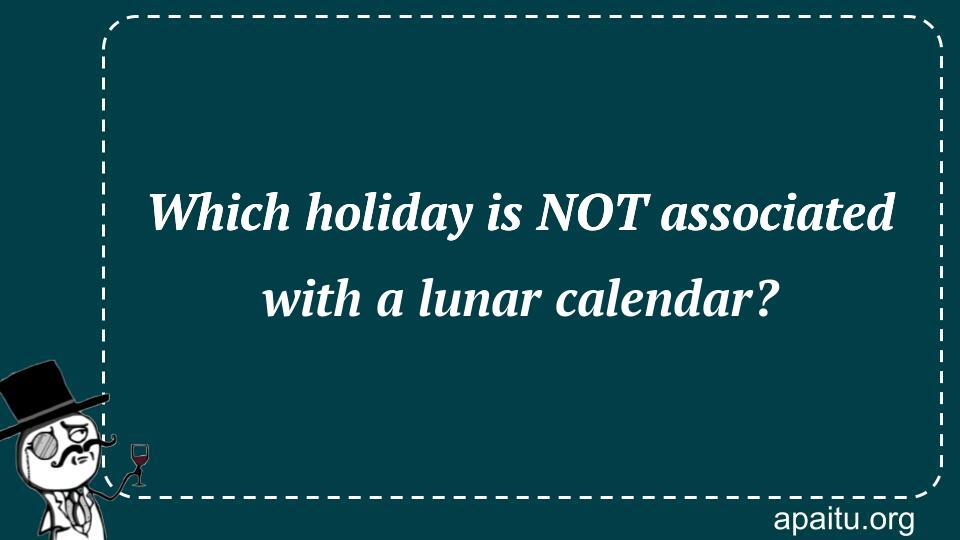Question
Here is the question : WHICH HOLIDAY IS NOT ASSOCIATED WITH A LUNAR CALENDAR?
Option
Here is the option for the question :
- Easter
- Eid al-Fitr
- Chinese New Year
- Halloween
The Answer:
And, the answer for the the question is :
Explanation:
Unlike solar calendars, which are based on Earth’s monthly orbit around the sun, lunar calendars instead take into account the moon’s phases to determine when certain events occur. The first Sunday after the first full moon after the vernal equinox is celebrated as Easter. The Islamic calendar, like the lunar calendar, is used to determine the day of Eid. On the second new moon after the winter solstice, the Chinese new year is celebrated. But regardless of the calendar you choose, October 31st is always Halloween.

Halloween is a holiday that is celebrated in many parts of the world, particularly in the United States and Canada. Unlike many other holidays, which are associated with a lunar calendar, Halloween is not tied to any specific lunar phase or cycle. Instead, it is celebrated on the same day every year, regardless of the phase of the moon.
Many holidays around the world are tied to a lunar calendar, which is based on the cycles of the moon. Lunar calendars have been used for thousands of years in many cultures, and they are still used today in many parts of the world. In a lunar calendar, the months are based on the phases of the moon, with each month beginning on the day of the new moon.
Some of the most well-known holidays that are associated with a lunar calendar include the Islamic holiday of Ramadan, which is celebrated during the ninth month of the Islamic calendar, and the Chinese New Year, which is celebrated on the first day of the lunar new year. Other holidays, such as the Jewish holiday of Passover and the Hindu festival of Diwali, are also tied to a lunar calendar.
While Halloween is not associated with a lunar calendar, it does have roots in ancient traditions that were tied to the cycles of the seasons. The holiday is believed to have originated with the ancient Celtic festival of Samhain, which was celebrated on November 1st. Samhain marked the end of the harvest season and the beginning of winter, and it was believed to be atime when the boundary between the living and the dead was at its thinnest. It was a time of great significance in Celtic culture, and it was believed to be a time when the spirits of the dead could return to the world of the living.
Over time, the traditions associated with Samhain were incorporated into Christian traditions, and the holiday became known as All Saints’ Day or All Hallows’ Day. The night before All Saints’ Day became known as All Hallows’ Eve, which was later shortened to Halloween. While the holiday no longer has the same religious significance that it once did, it remains a popular and much-loved holiday in many parts of the world.
Halloween is celebrated with a variety of traditions and activities, including dressing up in costumes, carving pumpkins, and trick-or-treating. While the holiday is not associated with a lunar calendar, it remains an important and much-loved part of many cultures around the world. Halloween is a time to celebrate the changing of the seasons, to connect with the past, and to enjoy the company of friends and family. Whether you celebrate with spooky costumes and ghost stories or with a cozy night in with loved ones, Halloween is a time to embrace the spirit of the season and to enjoy the many traditions and activities that make this holiday so special.